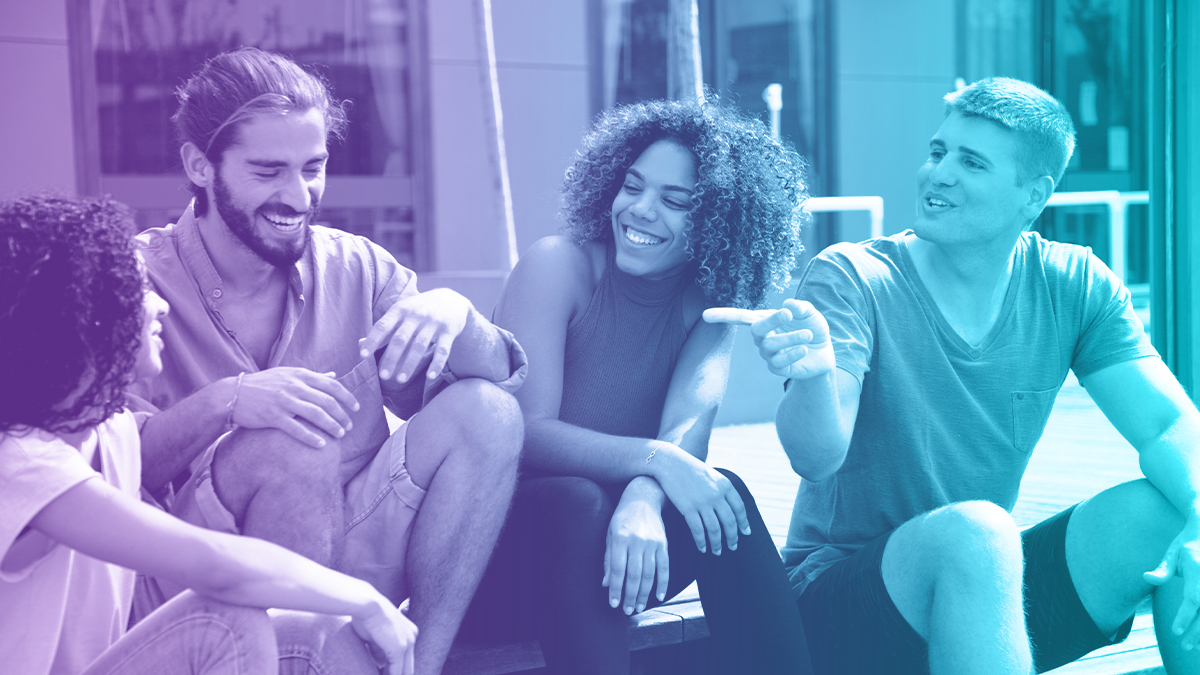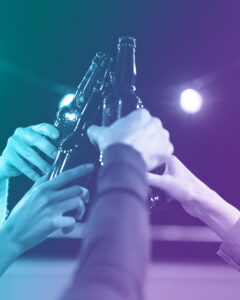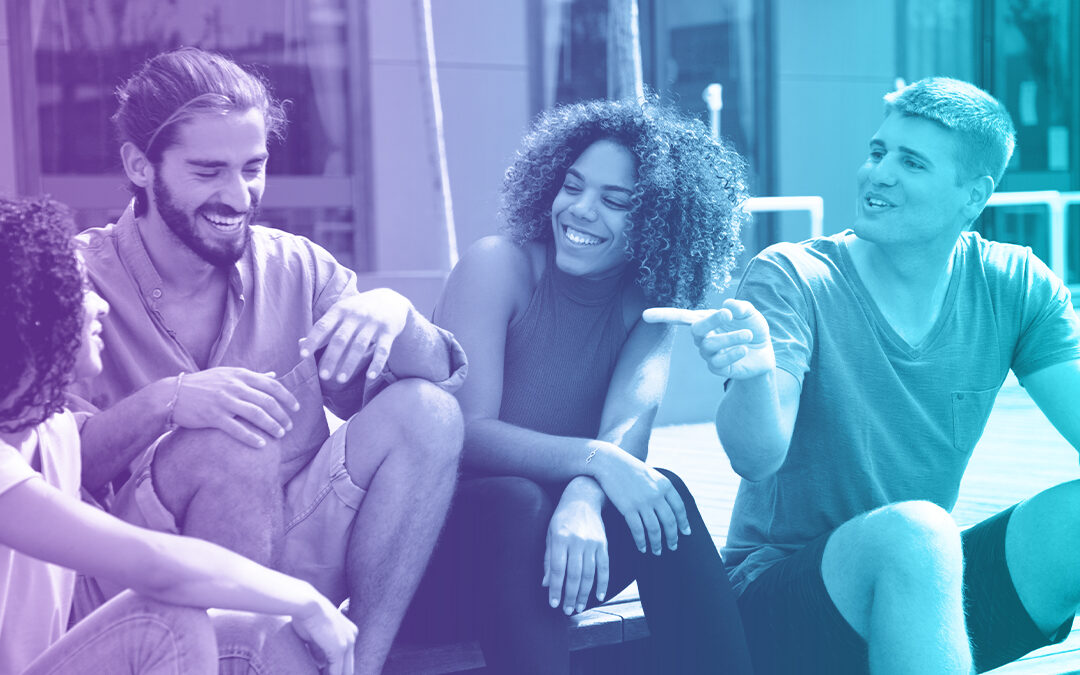Social Alcoholic
You always stayed away from alcohol, focusing on your studies and your future. As you got older and entered college, you started to expand your horizons more and attended frat and sorority parties. You never had more than a couple of red solo cups of beer here and there, but you found yourself having to always look after your roommate.

He never drank during the week and was actually a really good student. But at the parties, he became a totally different person, doing shots and keg stands left and right. He always became really loud and you never knew if tonight was the night he would punch a random person for looking at him wrong, or if he would attempt to jump off the roof into the pool. It was becoming too hard to manage him, so eventually you stopped hanging out with him. Why couldn’t he just drink to have fun instead of getting intoxicated every time?
In 2019, 21.7% of adults between the ages of 18 and 44 engaged in binge or heavy drinking in Hillsborough County. Clean Recovery Centers knows that sometimes these sessions are one-time things, and may be based on a social occasion. For those who find themselves managing binge drinking at events every time, we are here to help. The one-of-a-kind three-phase approach used at Clean addresses each aspect of addiction: spiritual, mental, physical, and social. Let’s discuss the social aspect further by exploring what social alcoholism is and how to help a loved one who may be experiencing it.
What Is a Social Alcoholic?
Social drinking typically refers to having drinks during events, such as family gatherings, business meetings, and parties. Alcohol is seen as a social substance, bringing people together over one common factor. However, social drinking can turn into social alcoholism. The person may only drink when they are out with family and friends, but the drinking can turn excessive. They will often try to coerce friends into binge drinking with them, as their drinking increases during social events. The person may even experience blackouts during events, and they may show signs of alcoholic behavior.
Signs and Behaviors of a Social Alcoholic
Signs that social drinking has become a problem can include:
- Drinking more than intended during an event or gathering
- Blacking out
- Feeling guilty after drinking when out with friends
- Hiding how much you are drinking during the social function – ordering doubles when getting a round for friends, sneaking extra alcohol when no one is looking, etc.
Social drinking is typically a responsible form of drinking as most will have one or two drinks and find a responsible way home. When drinking progresses to an alcohol use disorder– even when done socially – the person is more likely to engage in risky behaviors. Alcohol lowers inhibitions, meaning the brain has a more difficult time deciphering what is a responsible choice. The person may try to drive home even though they are intoxicated. They may also engage in unprotected sex with a friend or stranger, which increases the risk of contracting sexually transmitted diseases such as HIV/AIDS.
How Does Social Alcoholism Affect Relationships?
 Social alcoholism can seem to help relationships at first. You may become more boisterous and have an easy time making your friends laugh. But as drinking continues, you may come off as obnoxious or over the top. Alcohol can enhance personality traits, and can bring forward parts of your personality you aren’t familiar with. If you are already a risk taker, drinking heavily can bring that trait out. All of a sudden it seems like a good idea to jump up on the table and start dancing. This type of behavior is not socially acceptable, and is especially embarrassing for your friends. The relationships will begin to dissipate, as no one wants to be around you when you are drinking.
Social alcoholism can seem to help relationships at first. You may become more boisterous and have an easy time making your friends laugh. But as drinking continues, you may come off as obnoxious or over the top. Alcohol can enhance personality traits, and can bring forward parts of your personality you aren’t familiar with. If you are already a risk taker, drinking heavily can bring that trait out. All of a sudden it seems like a good idea to jump up on the table and start dancing. This type of behavior is not socially acceptable, and is especially embarrassing for your friends. The relationships will begin to dissipate, as no one wants to be around you when you are drinking.
Relationships at home can feel the effects as well. Your partner may feel neglected as you are always out with friends drinking and coming home intoxicated. This can create animosity toward you and eventually, your partner may not want to be around anymore. Even though you are only drinking socially, their needs seem to be unimportant as you spend more time away from home.
How Does Social Alcoholism Affect Health?
Even though social alcoholism means drinking a few nights or even just one night per week, the amount of alcohol being ingested can still affect physical health. Binge drinking can lead to falls and injuries due to the effects it has on the brain. When inhibitions are lowered, reading situations becomes difficult, leading to outbursts that can turn violent – even when the situation doesn’t warrant it.
Problems with the liver can still occur even when not drinking every day. Binge drinking alcohol increases the risks of liver disease and cancer. As social alcoholism continues throughout life, the heart muscle can become weakened and stretch, making it harder to pump blood throughout the body.
The Effects Social Alcoholism Have on Interactions
While some interactions may seem to be improved while drinking, social alcoholism will have more negative effects on how the person interacts with friends and family. One of the causes of social alcoholism is experiencing social anxiety. Social anxiety can be a disorder, and it is characterized by intense fear of judgment or being watched by others. In order to cope with this disorder, many turn to alcohol to help them “lighten up.” In doing so, they feel calmer in the social situation. However, this can hinder the way they respond to conversations or situations. They may misinterpret tone and react negatively when before drinking they would have been more rational.
People living with social alcoholism may also be overly friendly. They may interpret interactions as flirtatious and attempt to romanticize the situation. This has negative effects for two reasons. If the attention is not wanted and the person keeps pursuing, the results range from being kicked to even having the police get involved. On the other side, if the person ends up engaging in unprotected sex with the other person, unwanted pregnancy and exposure to a sexually transmitted disease can occur.
Family and Friends Dealing With Social Alcoholism
It can be difficult to be around a friend or family member who is living with social alcoholism. You know them as the person when they are not drinking, but when they are at a gathering with alcohol, it can seem like they are someone totally different. The best way to help them is to set consequences for their actions. If they come to a family event and drink too much, inform them when they are not drinking that they will no longer be invited to gatherings. Friends can extend the same consequence by not extending invites to the person when the group is going out for drinks. If alcoholism is still having negative impacts on them, suggest they look into a treatment program.
Overcoming Social Alcoholism and Moving Forward in Florida
Having one or two drinks socially does not necessarily indicate a problem with alcohol, but if you are finding yourself unable to control the amount you are drinking with friends, it is time to seek help. Finding treatment for alcohol use disorder can help you determine the underlying causes behind your drinking, and help you develop healthy coping skills. You will learn how to address social anxiety and manage being around family and friends while maintaining your recovery.
If you are worried about someone you love and social alcoholism, it’s not too late to call. Clean Recovery Centers is able to address mental health concerns, and even make them the primary diagnosis while still treating alcohol use disorder. With facilities throughout the Suncoast, we are ready to help your loved one get clean, live clean, and stay clean. Call us today at (888) 330-2532 to learn more about our program.
FAQs
What is an example of social drinking?
Social drinking refers to having one or two drinks in a public setting such as a family event, business meeting, or large-scale festival. An example would be having one or two glasses of wine at a friend or family member’s wedding.
How is social behavior related to alcohol?
Alcohol lowers inhibitions, leading to changes in social behavior. The person drinking may become more adventurous, violent, or emotional.
What is alcohol socialization?
Alcohol socialization refers to how we learn about alcohol in our environment and the influence that has. Some learn about alcohol through parents while others learn through a sibling or friends.
Sources:
- https://www.flhealthcharts.gov/ChartsReports/rdPage.aspx?rdReport=BrfssCounty.Dataviewer


